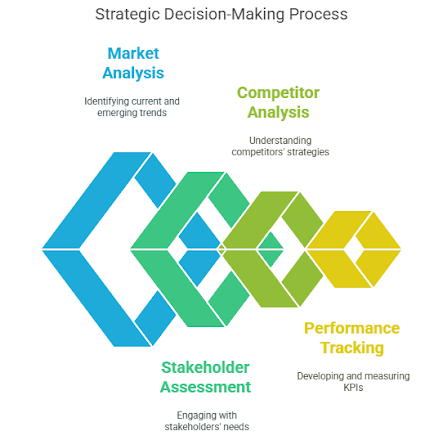Introduction
Imagine an organization navigating through turbulent markets without direction. Without the ability to analyze market dynamics, understand customer needs, or optimize internal processes, companies risk making misguided decisions. Business analysis is the compass that provides direction in uncertain terrains. Professionals equipped with certified business analysis professional CBAP certification are at the forefront, transforming raw data into actionable insights to influence strategic decisions.
In an era where businesses must be agile and data-driven, understanding how business analysis supports strategic decision-making is essential for both professionals and organizations.
Understanding Strategic Decision-Making Through Business Analysis
Strategic decision-making involves determining long-term objectives, allocating resources, and adapting to external influences. Business analysis enables this process by offering:
- Market Analysis: A certified business analyst professional (CBAP) identifies current and emerging trends, ensuring strategies align with market demands.
- Stakeholder Needs Assessment: Analysts engage with stakeholders to ensure that decisions address organizational goals and individual priorities.
- Competitor Analysis: By understanding competitors’ strategies, analysts can position their organizations to gain competitive advantages.
- Performance Tracking : Business analysts develop the key performance indicators (KPIs) to measure strategies efficacy in an ongoing manner.
These contributions ensure decisions are well-informed, minimizing risks while maximizing opportunities.
The Key Contributions of Business Analysis to Strategic Planning
Business analysis strengthens strategic decision-making by providing:
- Data-Driven Insights: Analysts use data analytics to uncover trends and make fact-based recommendations.
- Resource Optimization: Business analysts identify areas of inefficiency, suggesting improvements to reduce costs and increase productivity.
- Change Management: Analysts guide teams through organizational changes, ensuring minimal disruption to workflows.
- Collaboration Enhancement: Facilitating communication among departments ensures cohesive decision-making.
- Customer-Centric Approaches: Analysts identify customer pain points, enabling organizations to develop solutions that resonate with their audience.
- Problem-Solving Frameworks: Business analysts use methodologies like Six Sigma and Lean to address organizational challenges systematically.
- Strategic Alignment: They ensure that every project and initiative aligns with the broader business objectives, creating a unified vision across teams.
These contributions highlight the indispensable role of certified business analyst certification holders in driving successful strategies.
Advanced Tools and Techniques in Business Analysis
In today’s fast-paced world, technology plays a critical role in business analysis. Tools and methodologies empower analysts to extract meaningful insights from complex data sets. Key tools include:
- SWOT Analysis: Used for the organization to know about its internal strengths and weaknesses or external opportunities & threats.
- Business Process Modeling (BPM): Visualizes workflows to optimize processes.
- Root Cause Analysis: Diagnoses issues to uncover underlying causes of business problems.
- Predictive Analytics: Forecasts trends using new analytics tools.
Mastering these tools, especially with the knowledge gained through business analyst certification CBAP, enables professionals to handle even the most complex challenges.
The Role of Certifications in Shaping Skilled Analysts
Here’s how certifications enhance professional capabilities:
- Global Recognition: It validates skills internationally, opening doors to global opportunities.
- Enhanced Problem-Solving Skills: Training sharpens the ability to solve complex business challenges.
- Confidence Boost: Certification builds confidence to tackle high-stakes projects.
- Networking Opportunities: Certification connects analysts with a community of like-minded professionals.
- Staying Updated: Programs like the Certified Business Analysis Professional (CBAP) certification are aligned with current industry standards, ensuring knowledge remains relevant.
Conclusion
The power of business analysis in strategic decision-making is undeniable. From aligning organizational goals to optimizing resources and driving customer-centric innovations, business analysts are pivotal in shaping the future of businesses.
If you aspire to make a lasting impact, start by earning a certified business analysis professional CBAP certification.
Begin your journey to becoming a strategic influencer today. Enroll in the certified business analyst certification program and take the first step toward transforming your career. The future of strategic decision-making awaits you now!
